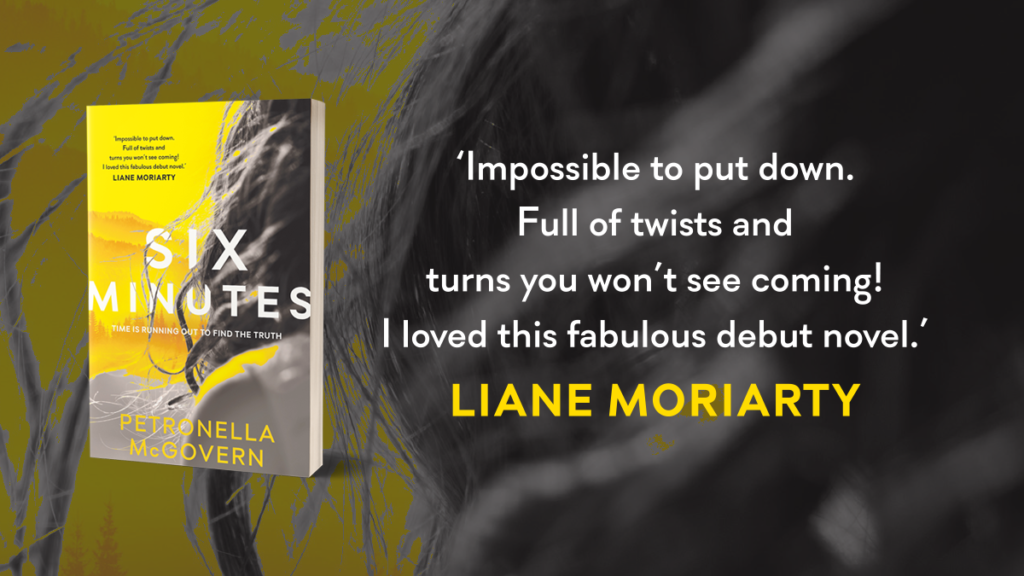Six Minutes
One morning, Lexie Parker dashes to the shop, leaving Bella in the safe care of the other mums in the playgroup.
Six minutes later, Bella is gone.
Police and media descend on the tiny village on the edge of Canberra. Locals unite to search the dense bushland. But as the investigation continues, relationships start to fracture, online hate messages target Lexie, and the community is engulfed by fear.
Is Bella’s disappearance connected to the angry protests at Parliament House? What secrets are the parents hiding? And why does a local teacher keep a photo of Bella in his lounge room?

When did you first develop a passion for writing?
Since I was a child, I’ve always loved stories so my passion for writing stemmed from there. My mum used to read to us from the A. A. Milne books and then I read a lot of The Famous Five and The Secret Seven. I grew up on a farm and I used to write short stories about our cats, dogs and horses having lots of adventures – and they could all speak! On my grandmother’s side, I’m related to the founders of Foyles Bookshop in London so perhaps a love for books has been handed down the generations.
What is your writing process?
Even though I’m not a morning person, I’ve discovered that my most creative, most focused time is in the morning. I wake up early before the rest of the family and write for an hour or so in the quiet time. I only open my manuscript and try not to click on anything else on my laptop! First thing in the morning, I feel that I have a clear head, uncluttered by emails and news and social media. Once I’ve that early morning burst, then I find it’s much easier to come back to the novel later in the day after doing other work. It means I’m keeping the story in my head all the time. In terms of ideas and plotting, I generally know the beginning and the end of my story but I’m not sure what happens in between those two points. I need to write it to find out!
What inspired you to write Six Minutes?
When my son was three years old, he went missing in Questacon, the science museum in Canberra. While we were frantically searching for him, lots of terrible possibilities rushed through my mind. Afterwards, I kept thinking about that moment – a child disappearing in an instant. At the same time, I was in a wonderful playgroup with other mums and children. I started to wonder what would happen if a child went missing from a safe place, like a playgroup. How would the group react? Would they all be supportive? Would some blame the others? How would the mother of the missing child respond to the other mums? I was interested in exploring these ideas of friendship, blame and guilt.
How did you develop the characters in Six Minutes?
The story is told from the perspectives of five different characters – two females and three males. Lexie, the mother of the missing child, is a very strong character who came to me straight away. She’s anxious and fearful – an extreme version of a helicopter parent. The other playgroup mothers are readily recognisable – the relaxed mum, the highly organised mum, the kind mum and the addicted-to-social-media mum. While we all know people like these, the characters are not stereotypes – they’re complex with their own secrets and motivations. The father of the missing child is a paediatrician and another main male character is a detective. I interviewed a number of doctors and police officers; my deeper understanding of their work helped me develop these two characters more fully.
Six Minutes is your debut novel. What are your favourite debut novels?
The Lovely Bones and The Time Traveller’s Wife aren’t recent debuts but they’re really interesting books because they play around with concepts of time and narration. Two great recent Australian debuts are The Dark Lake by Sarah Bailey and The Second Cure by Margaret Morgan. The Second Cure has undertones of The Handmaid’s Tale but it’s set in near-future Australia and brings together different aspects of human nature, science, politics and religion.
Who are your favourite crime novelists?
As a teenager, I loved reading Agatha Christie and trying to solve her puzzles. There are lots of great Australian crime writers at the moment – Michael Robotham, Sarah Bailey, Candice Fox, Mark Brandi and Jane Harper, just to name a few. In terms of overseas writers, I really enjoy Sophie Hannah, Tana French and Val McDermid. I love a good psychological thriller, which doesn’t always fit into the crime category – books by Gillian Flynn, Liane Moriarty and B.M. Carroll. There are so many good ones out at the moment!
What advice would you give to emerging writers?
My advice firstly is to make the time to write. It’s hard to prioritise writing when you’re working and have a family or other responsibilities but unless you prioritise it, no-one else will. To help with that, it’s often useful to do a writing course or enter writing competitions so that you have external deadlines to meet. As writing can be such a solitary activity, it’s also useful to find a writing community or a writers’ group, with whom you can share your work. It’s great to be able to discuss issues with other writers and get feedback on your drafts. I worked on Six Minutes over a number of years, editing and re-writing, and my writers’ group was very encouraging and helped me to persevere until it was published.
Content supplied with the assistance of Allen & Unwin Australia


